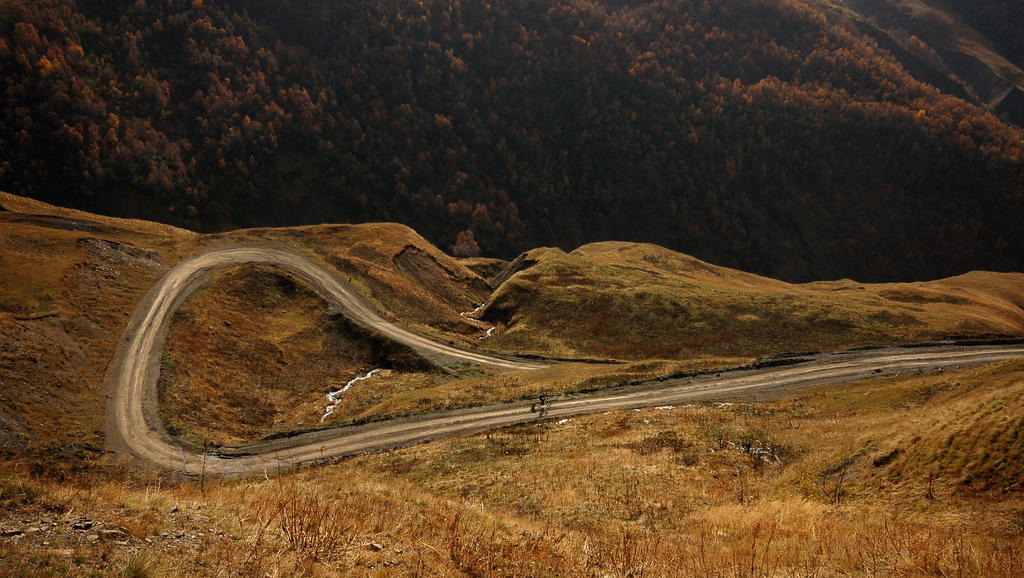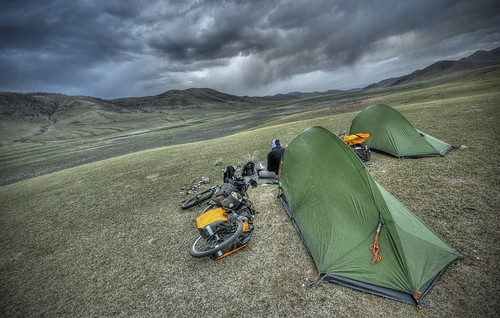Bulgaria. Autumn. I roll to a halt beside Andy. “Mate,” he says. “We have a problem. A really big problem.” I look down. There’s a six-inch crack along the rim of his rear wheel and the inner tube is bulging horribly from the gaping maw. We are only 3 months into our round-the-world bike ride.
What the heck are we supposed to do now?
Turkey. Winter. She’s really rather pretty. Or perhaps it’s the drugs. The ambulance lurches to one side. We’re arriving at the hospital. The cute paramedic get to her feet, and my attention returns to the deep throbbing pain in my face. I am covered in blood, blind in one eye and I have very little idea what just happened.
What the heck am I supposed to do now?
Mongolia. Spring. We look at each other in horror. We have each assumed that the other would bring spare inner-tubes and a puncture repair kit. It’s a thousand kilometres to the nearest asphalt and the valve on Andy’s rear wheel has just snapped off.
Why was it always Andy’s rear wheel?
And what the heck are we supposed to do now?
Oman. Summer. I am drenched in sweat. It’s 40 degrees and climbing, and the humidity is hovering at 100%. It’s a week’s ride back to the nearest city, and I am standing in the middle of the desert with a piece of snapped metal in my hands and my worldly possessions at my feet. The breakage is irreparable.
What the heck am I supposed to do now?
* * *
Nothing worth doing ever went according to plan.
This is particularly true of long bicycle journeys. It does not matter how prepared you think you are. It does not matter how much money you spend on fancy gear. And it does not matter how many precautions you take. Something is going to go wrong.
What does matter is how you react when it happens.
The anecdotes above are some of my own. I have dozens more. Every long-term traveller does. We collect them, in fact, as fond memories. They are the moments in which we are truly tested; in which the world conspires to offer us lessons about ourselves.
Needless to say, these moments are also the ones we can look back on and laugh about. We found solutions; ones that we could never have planned to find, and that were born of immediate necessity.
What’s (really) the worst that can happen? Here’s the answer:
First, you stand paralysed, crippled. What the heck are you supposed to do now?
Then you realise that the time has come. You must solve the problem yourself. You must solve it by whatever means necessary.
And then you go ahead and do whatever needs to be done.
* * *
We dug out the Gaffa Tape, bandaged the cracked wheel, and avoided all potholes. It lasted another 750km until we replaced it in Istanbul.
I had four stitches in my face. The police put us up in a hotel. I rode on with one eye until the other healed. I still have the scars.
Andy had been using a discarded road-bike inner tube as a bungee cord. We put it in the mountain bike tyre anyway and hoped for the best. It lasted the rest of the trip.
I stuck out my thumb. A pickup stopped, and within two hours I was back in the city. I binned the broken trailer, strapped the heap of luggage to the back rack, and cycled to Dubai.
* * *
So hope for the best — always. Prepare for the worst — if you want to. But never let the fear of something going wrong prevent you from giving it a go.
Because if everything is going exactly according to plan, you aren’t taking enough risks. You’re not learning anything. And so it’s questionable whether you can call it an adventure at all.
What’s (really) the worst that could happen?





Something to add?